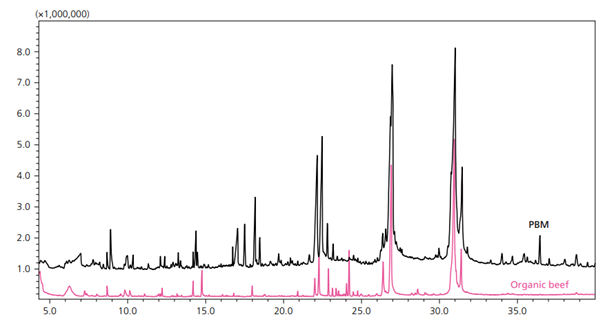
Panel discussion on...
Healthy lifestyle
Welcome in the world of alternative meat: analytical challenges and perspectives

Introduction
1) Over the past two years, 55% of consumers have demonstrated increased awareness of health-related matters. The latest consumer trends emphasize healthier snacking and enhancing mental sharpness and awareness. In today’s world, consumers are most concerned about the costs associated with maintaining a healthy lifestyle, as well as their mental well-being, stress levels, and sleep quality. (1) (2) (3)
Euromonitor reports that consumers who are seeking to streamline expenses and adopt a more holistic view of health are actively looking for products that deliver efficacy without the need to take multiple pills. The concept of multifunctionality arises from consumer feedback regarding pill fatigue, effectiveness, and pricing (4). Collagen peptides, which are positioned as a trendy andmultifunctional health ingredient, can be seamlessly integrated into functional food and beverage markets. Based on our latest research(5)(6) that focuses on mental well-being, collagen peptides ( SOLUGEL@ CP) deliver unique value to address these consumer lifestyle changes.
2) Research priorities are ever-evolving, shaped by emerging health challenges, public health concerns, and scientific advancements. Traditionally, cardiovascular health, cancer, infectious diseases, and mental health have been major areas of investigation. However, the research landscape remains dynamic, with new interests continually emerging .(7)
Specifically with regard to research on collagen (type I/III, hydrolyzed and oral intake), scientific evidence has supported major health benefits associated with collagen, including skin health, joint health, bone health, weight management, and support for physical activity and sports over the past four decades. (8-9)
Whereas the major health benefits (skin, bone and joint health) have been extensively researched for the last three to four years, more recent scientific literature is now focusing on immune health, mental health, intestinal and gut health, and chronic diseases (such as cardiovascular diseases, diabetes, and obesity). Notably, mental and brain health, along with intestinal and gut health, have emerged as prominent topics in collagen research over the last 1-2 years. (7-9)
4) Consumers seek supplements with diverse nutritional and health claims, with a particular focus on supplements rich in vitamins and minerals. In addition, they prefer supplements that are 100% natural and backed by clinical evidence regarding their health benefits (10-11).
When making purchasing decisions, consumers weigh up several factors including pricing, health implications, scientific validation, and ingredient quality. Moreover, substantiation of claims becomes very important. Beyond health claims, consumers go the extra mile to research scientific data supporting the supplement and its ingredients (12-13).
5) Consumers nowadays express the least satisfaction with their energy levels, waistline, digestive health, and mental well-being. These areas represent an opportunity for various supplements to address these specific needs.
Recent research on collagen supplementation has opened up a promising new era for immune health, mental well-being, digestive health, weight management, and even sleep (14).
6) For supplements, traditional supplement formats remain the most popular, but the jellies/gummies segment has been growing fast. These preferences are similar across various regions (15-16).
For collagen supplementation, the most popular formats are powder and shots for type I & III collagen thanks to their excellent physical properties such as good organoleptic, dissolutions, and (heat) stability. Meanwhile, for type II collagen the traditional supplement formats such as capsules and tablets are more popular thanks to the lower recommended daily dosage. Most clinical trials of collagen ingredients are often carried out in a powder format where consumers can add the powder to their choice of beverage or food. This is the most convenient format that offers flexibility.
The supplement industry would need to consider alternative delivery formats to fight against consumer “pill fatigue”. Therefore, a technological breakthrough to allow health ingredients to be incorporated into other categories such as food and beverage could offer huge potential, especially for the ingredients that have good consumer awareness such as collagen.
7) Globally, consumers are prioritizing immunity and mental well-being. The top health categories include immunity, mental well-being, digestive health, heart health, energy levels (17). While there are distinct variations in health priorities across different regions, digestive health, mental well-being, and immunity are emerging as the most prevalent and impactful concerns worldwide .
10) Sustainability has become a significant concern within the nutraceutical industry. Notably, 42% of consumers actively investigate ethical and environmental aspects related to the supplements they intend to purchase (18-19). Moreover, over one half of consumers believe that nutritional supplements can be enhanced by utilizing more ethical and environmentally friendly products (20).
Brands that can substantiate ethical and environmental claims will stand out and be perceived as offering superior products. Consumers are open to embracing marketing concepts and products that align with attributes such as animal well-being. In addition, consumers are now increasingly familiar with the concept of grass-fed products and recognize the associated benefits they offer.
The production of collagen peptides has an inherent upcycling quality. By processing residual productsof the meat and fish industry, we ensure that we make the most of our planet’s resources. As an ingredient supplier, we have created a distinctive product: certified grass-fed collagen peptides. Cattle are raised outdoors on pasture 365 days a year, with unrestricted access to fresh grass, air, land, and water. Our collagen peptides is sourced from cattle that are free from hormone applications, anabolic steroids, antimicrobial substances, and synthetic drugs. We proudly hold third-party certification (by LIAF), ensuring full traceability of our products.
12) In a recent clinical trial funded by PB Leiner, a research team at Florida State University found that the supplementation of collagen peptides (SOLUGEL® CP) not only helps to relieve joint pain for active middle-aged adults and increases their daily living activities but it now also has a proven effect on the mental well-being of this demographic group (5, 6)
Several mega-trends contribute to the significance of this finding: the global aging population, longer life expectancy, and the pursuit of a high quality of life during the aging process. While pain serves as a major barrier to exercise, the reality is that exercise itself is a solution to pain. Breaking this cycle — for example through pain-reducing supplements — can facilitate exercise the initiation of exercise or allow continued physical activity management, playing a crucial role in healthy aging and overall quality of life. (21, 5, 22)
The study was uniquely designed to address the specific needs of a target population: healthy, active middle-aged adults experiencing some degree of pain. Although the study was conducted in the United States, the outcomes are expected to benefit similar target populations in other regions.(5)
The implications of this research span multiple critical areas: elderly nutrition to support quality of life during aging, adult nutrition for pain relief and joint health, and sports nutrition to support mobility for healthy, active middle-aged adults. (21, 9)
SOLUGEL® COLLAGEN PEPTIDES
SOLUGEL® is a brand of clinically proven collagen peptides that provides solutions for a wide range of health benefits for the target consumers. These highly bioactive peptides are obtained from natural collagen-rich sources, using state-of-the-art technology and resulting in premium quality that can be easily incorporated into many different applications.
What are the most effective methods for enhancing the flavor and texture of alternative proteins?There are meaningful reasons not to go for these new types of foods
Bad experience in terms of taste and texture
Raw meat on its own has little aroma; therefore, almost all aromas associated with “meatiness” are created during the cooking process by the Maillard Reaction between amino acids and reducing sugars. That reaction determines which non-volatile precursors release volatile aroma compounds. Plant-based meat (PBM), products created to resemble animal meat in both look and taste, are growing in popularity. A plant protein such as soy protein concentrate, along with colors, stabilizers, and oils, is used to successfully mimic meat flavor and texture. And, just like in animal meat, the amino acids of that protein undergo the Maillard Reaction.
Samples of PBM were run with the solid phase microextraction GC-MS and the volatile profile was compared against that of the organic beef. Similar compounds, such as fatty acids and Maillard browning reaction products, were found in both types of meat (Figure 1).
The differences can be explained by the different and wide variety of precursors present in PBM since it contains amino acids and sugars from various sources as opposed to regular meat.
There are five basic tastes, including deliciousness, which are perceived by people. The amount and kind of amino acids contribute to taste components. Of all the amino acids, glutamic acid is widely known as a component of the delicious taste. Further, the types and component ratios of amino acids largely control the flavor of food products. For example, glycine and alanine are associated with sweetness, valine and leucine with bitterness, and aspartic acid and glutamic acid with deliciousness.
The texture of food, including the sense of crispness, springiness, firmness, and the feeling on the tongue, is an important element that together with taste has an impact on the deliciousness of food. Food texture is normally evaluated using sensory tests. However, sensory tests are often difficult to reproduce, due to individual differences in people’s sensations and physical condition.
A texture analyzer can support sensory test with objective results in the form of numerical values for use in the field of food development. The texture analyzer evaluates the texture characteristics and allows a comparison of the texture of plant-based meat (PBM) and, for instance, chicken meatballs. Compared to chicken-derived products, plant-based meatballs had a higher force under loading conditions with less elasticity, which is the property to restore deformation (6). It is consistent with the result of the sensory test.

Figure 1. Overlaid Representative Chromatograms for PBM (black) and Organic Beef (pink) (6).
Panelists
References and notes
- FMCG Gurus. Active Nutrition Survey. AN805.
- FMCG Gurus. Active Nutrition Survey. AN358.
- FMCG Gurus. Active Nutrition Survey. AN314.
- The Five Trends Pushing Global Consumer Health into 2024. Euromonitor.com. October 10, 2023.
- Kviatkovsky SA, Hickner RC, Cabre HE, Small SD, Ormsbee MJ. Collagen peptides supplementation improves function, pain, and physical and mental outcomes in active adults. J Int Soc Sports Nutr. 2023;20(1):690-707. https://www.ncbi.nlm.nih.gov/pubmed/37551682
- Kviatkovsky SA, Hickner RC, Gipson SD, Cabre HE, Hanna BR, Colannino HG, et al. Collagen Peptide Supplementation Improves Mental Component Scores of the VR-12 in Active Adults. Journal of the International Society of Sports Nutrition. 2023;20:49-50. https://www.tandfonline.com/doi/full/10.1080/15502783.2023.2187955
- Gresham G, Meinert JL, Gresham AG, Piantadosi S, Meinert CL. Update on the clinical trial landscape: analysis of ClinicalTrials.gov registration data, 2000-2020. Trials. 2022;23(1):858. https://www.ncbi.nlm.nih.gov/pubmed/36203212
- Chen M, Li Y, Huang G. Potential Health Functions of Collagen Bioactive Peptides: A Review. American Journal of Biochemistry and Biotechnology. 2020;16(4):507-19. https://thescipub.com/abstract/ajbbsp.2020.507.519
- Holwerda AM, van Loon LJC. The impact of collagen protein ingestion on musculoskeletal connective tissue remodeling: a narrative review. Nutr Rev. 2022;80(6):1497-514. https://www.ncbi.nlm.nih.gov/pubmed/34605901
- FMCG Gurus. Nutritional Supplements Survey. NS125.
- FMCG Gurus. Nutritional Supplements Survey. NS197.
- FMCG Gurus. Nutritional Supplements Survey. NS513.
- FMCG Gurus. Nutritional Supplements Survey. NS609.
- FMCG Gurus. Active Nutrition Survey. AN449.
- FMCG Gurus. Nutritional Supplements Survey. NS251.
- INNOVA database.
- FMCG Gurus. Active Nutrition Survey. AN586.
- FMCG Gurus. Nutritional Supplements Survey. NS609.
- INNOVA database.
- FMCG Gurus. Nutritional Supplements Survey. NS267
- Kviatkovsky SA, Hickner RC, Ormsbee MJ. Collagen peptide supplementation for pain and function: is it effective? Curr Opin Clin Nutr Metab Care. 2022;25(6):401-6. https://www.ncbi.nlm.nih.gov/pubmed/36044324
- Kviatkovsky SA, Hickner RC, Gipson SD, Cabre HE, Hanna BR, Colannino HG, et al. Peptide Supplementation Improves Measures of Activities of Daily Living and Pain in Active Adults. Journal of the International Society of Sports Nutrition. 2022;19 35-6. https://www.tandfonline.com/doi/full/10.1080/15502783.2022.2056381
Questions
1.
2.
3.
4.
5.
How have consumer awareness & demands related to healthy lifestyle changed in the last 12 months?
Where do you see the greatest scientific achievement in nutritional sciences in the last 12 months?
Are there specific health benefit areas in which significant more clinical studies are being done than in others, comparing the last 3 years?
What are the key influencers driving consumer purchasing decision for supplements or health foods? Is substantiation of claims important?
How do consumer today judge their health status?
Please put the following parameter in order 1 highest priority 7 lowest priority:
- Physical Symptoms, like pain, fatigue, constipation, weight gain
- Fitness Levels: endurance, strength, flexibility,
- Health Tracking Devices and heart rate, sleep patterns, steps taken
- Diet and Nutrition: intake of fruits, vegetables, whole grains, proteins.
- Mental and Emotional Well-being: stress levels, emotional balance, happiness
- Quality of sleep: Sleep quality and duration
- Medical Check-ups: blood pressure checks, cholesterol screenings, blood sugar tests
6.
Delivery formats can support consumer compliance and underline the technology driven approach of the brand.
a.
b.
c.
Do you see a consumer trend in preferences for certain delivery formats?
Are delivery format preference a regional, cultural aspect like taste?
Do you see a trend to carry out ingredient clinical trials using a selected delivery format as study product formulation or are most clinical studies still done in capsules?
7.
Consumer health concerns can vary widely across different regions and demographics globally. However, several common health concerns tend to be prevalent across various countries and populations due to globalization, lifestyle changes, environmental factors, and access to information.
a.
b.
Which are the key global consumer health concerns?
Do you see regional differences?
8.
There is a significant increase in the availability of apps and digital platforms focused on healthy lifestyle, particularly to support personalized approaches to mental wellbeing, metabolic support, weight management and physical fitness.
a.
b.
c.
d.
Do you see lifestyle apps as competition for supplement brands?
Do you think that these apps help to educate consumers, being more targeted when searching for supplements?
Did you consider setting up a lifestyle app to promote your supplement or your ingredient?
Did you set up a lifestyle app to promote your supplement/ ingredient and can you explore about your experience and business impact?
9.
AI (Artificial Intelligence) algorithms are today offered for various aspects of clinical trials to proof efficacy of your health ingredient or supplement.
a.
b.
c.
d.
Are consumers looking for substantiation of claims through AI driven clinical trials?
Did you consider working with an CRO specialist in AI to investigate your health ingredient or supplement?
If you applied already AI methods during the discovers/ development of your health ingredient, please share your experience and recommendation with us.
Do you think that in 2030 AI will be a manifest tool for clinical trials?
10.
A healthy lifestyle may also involve a commitment to sustainable practices for both personal and planetary health. This could include supporting ethical and environmentally conscious products.
a.
b.
c.
d.
e.
Do you agree that sustainability has become a growing concern also in the nutraceutical industry?
Are consumer looking proactively for brands which have ethical and environmental principles?
Are you looking for ethically sourced raw materials, ingredients?
Did you implement measures to establish resource-efficient processes?
Are you developing socially useful products and how do you define it?
11.
What are the major geographical differences related to healthy lifestyle trends?
a.
b.
c.
d.
e.
What are the latest trends related to claims and product forms in China?
In the U.S.
In Mexico
How are claims and dosage forms differentiated in Europe? How does your company ensure compliance with health and safety regulations in Europe?
Do you have a country where you would like to speak about trends for products?
12.
Focus clinical studies. Overall, there has been a recognized push for more gender-inclusive, geographical, and target group focused clinical research. The same trend can be seen in clinical trials for supplements or functional foods.
a.
b.
c.
d.
Please select an area you are active in and let us know which is your hot topic ingredients for 2024 for this area, based on substantiated claim, parameters, biomarkers being studied and/ or clinical study being done. Please name ingredients by scientific name and composition and not by brand name.
Please select your geographical area:
Western (EU, USA)
Asia (China, Japan, Asia Pacific)
Americas (Middle and Latin America)
Kids development/ early life nutrition/infant in Western countries and AP
Adult nutrition and prevention of developing disease
Elderly nutrition and how to support quality of life during aging
Sports nutrition, within different life decades and activity levels
References and notes

























